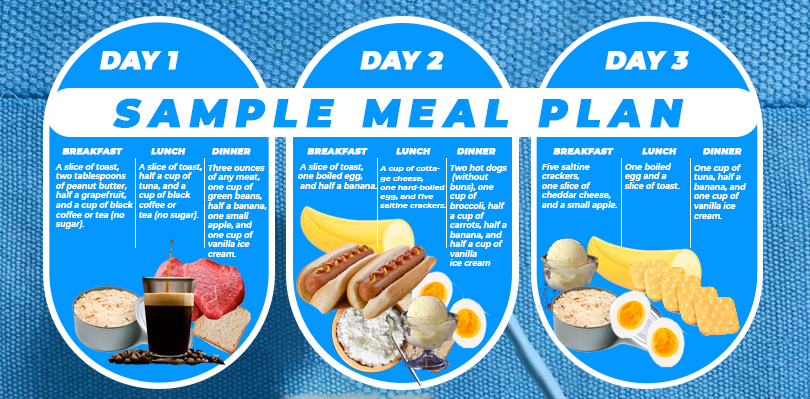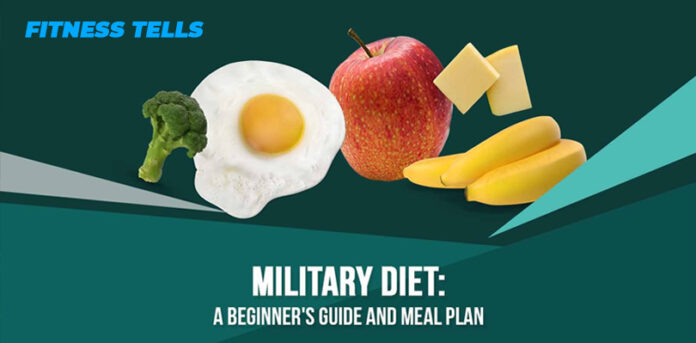Regarding weight loss and improved health, few diets have gained as much attention as the Military Diet. Despite its somewhat intimidating name, this structured diet plan offers a straightforward approach to shedding pounds and accelerating your metabolism.
What Is Military Diet And How It Works?
The 3-Day Diet, also known as the Military Diet, is a short-term diet plan that promises quick weight loss. Despite its name, it has no affiliation with any military branch. The diet involves strict meal plans for three days, followed by four days of normal eating. This cycle can be repeated to achieve weight loss goals.
During the three-day plan, specific foods in specific portions are consumed. The diet’s supporters claim that up to 10 pounds (4.5 kg) of weight can be lost in a week, though most of this weight loss is due to water loss and reduced calorie intake, not fat loss..
Sample Meal Plan

Here’s a basic sample meal plan of the Military Diet’s for each of the three days:
Day 1:
- Breakfast: A slice of toast, two tablespoons of peanut butter, half a grapefruit, and a cup of black coffee or tea (no sugar).
- Lunch: A slice of toast, half a cup of tuna, and a cup of black coffee or tea (no sugar).
- Dinner: Three ounces of any meat, one cup of green beans, half a banana, one small apple, and one cup of vanilla ice cream.
Day 2:
- Breakfast: A slice of toast, one boiled egg, and half a banana.
- Lunch: A cup of cottage cheese, one hard-boiled egg, and five saltine crackers.
- Dinner: Two hot dogs (without buns), one cup of broccoli, half a cup of carrots, half a banana, and half a cup of vanilla ice cream.
Day 3:
- Breakfast: Five saltine crackers, one slice of cheddar cheese, and a small apple.
- Lunch: One boiled egg and a slice of toast.
- Dinner: One cup of tuna, half a banana, and one cup of vanilla ice cream.
It’s worth noting that the Military Diet may cause short-term weight loss for certain individuals. However, it’s not a sustainable or balanced meal plan. Due to its low-calorie nature, people may feel hungry and miss out on vital nutrients. The diet’s fast weight loss claims are often short-lived and could be due to water weight instead of actual fat loss.
Pros Of The Military Diet
- Rapid Initial Weight Loss
- Quick results and motivational
- Simple and easy-to-follow structure
- Focus on whole foods
- Convenient for busy individuals
- No need for special ingredients
- Affordability and accessibility make it a budget-friendly
- Controlled portion sizes
- Awareness of calorie intake
- The short duration of the diet
Cons
- Lack of long-term sustainability
- Extreme calorie restriction
- Minimal scientific backing
- Potential muscle loss
- Limited food choices
- Potential nutrient deficiencies
- Weight regain
- Lack of lifestyle changes
- Possible metabolic slowdown
- Not suitable for all
- Potential for binge eating
- Dehydration
Scientific Evidence And Research
Limited Research
- There is a scarcity of peer-reviewed, published studies specifically assessing the Military Diet’s effects on weight loss, health, and long-term outcomes.
- The lack of comprehensive research makes it challenging to draw definitive conclusions about its efficacy and safety.
Short-Term Weight Loss
- Some anecdotal reports suggest that the Military Diet can lead to short-term weight loss, primarily due to its calorie-restricted nature.
- However, most studies that do exist are small and have short durations, making it difficult to determine long-term effects.
Lack of Data on Health Outcomes
- Comprehensive research on the impact of the Military Diet on health markers like cholesterol levels, blood pressure, and insulin sensitivity is lacking.
- The diet’s emphasis on certain foods, such as grapefruit and tuna, has prompted concerns regarding nutritional imbalances.
Some limited studies show that the Military Diet may lead to short-term weight loss, however, there is a lack of extensive scientific evidence to back its long-term efficacy and safety. Nutrition experts commonly warn against severe calorie-restricted diets like the Military Diet and stress the significance of sustainable, balanced, and individualized approaches to achieve lasting health and weight management goals.
FAQs
Is the Military Diet safe for everyone?
The Military Diet may not be safe for everyone, especially those with certain medical conditions or dietary restrictions. It’s essential to consult with a healthcare professional before starting any restrictive diet to ensure it’s suitable for your specific health needs.
Can I follow the Military Diet for an extended period?
The Military Diet is designed for short-term use, typically three days at a time, followed by four days of normal eating. Attempting to follow it for an extended period may lead to nutrient deficiencies and other health risks. Long-term sustainable dietary changes are recommended for overall health and weight management.
Does the Military Diet guarantee long-term weight loss?
While some individuals may experience short-term weight loss on the Military Diet, it does not guarantee lasting results. Rapid weight loss followed by weight regain is a common outcome of this diet. To achieve and maintain long-term weight loss, it’s advisable to adopt healthy, sustainable eating habits and lifestyle changes.

